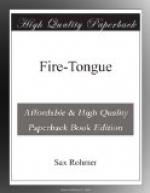When presently he left the house, carrying a brown leather bag which he had borrowed from the butler, he knew that rightly or wrongly his own opinion remained unchanged in spite of the stubborn opposition of the Scottish physician. The bogus message remained to be explained, and the assault in the square, as did the purpose of the burglar to whom gold and silver plate made no appeal. More important even than these points were the dead man’s extraordinary words: “Fire-Tongue”—“Nicol Brinn.” Finally and conclusively, he had detected the note of danger outside and inside the house; and now as he began to cross the square it touched him again intimately.
He looked up at the darkened sky. A black cloud was moving slowly overhead, high above the roof of the late Sir Charles Abingdon; and as he watched its stealthy approach it seemed to Paul Harley to be the symbol of that dread in which latterly Sir Charles’s life had lain, beneath which he had died, and which now was stretching out, mysterious and menacing, over himself.
CHAPTER IV. INTRODUCING MR. NICOL BRINN
At about nine o’clock on the same evening, a man stood at a large window which overlooked Piccadilly and the Green Park. The room to which the window belonged was justly considered one of the notable sights of London and doubtless would have received suitable mention in the “Blue Guide” had the room been accessible to the general public. It was, on the contrary, accessible only to the personal friends of Mr. Nicol Brinn. As Mr. Nicol Brinn had a rarely critical taste in friendship, none but a fortunate few had seen the long room with its two large windows overlooking Piccadilly.
The man at the window was interested in a car which, approaching from the direction of the Circus, had slowed down immediately opposite and now was being turned, the chauffeur’s apparent intention being to pull up at the door below. He had seen the face of the occupant and had recognized it even from that elevation. He was interested; and since only unusual things aroused any semblance of interest in the man who now stood at the window, one might have surmised that there was something unusual about the present visitor, or in his having decided to call at those chambers; and that such was indeed his purpose an upward glance which he cast in the direction of the balcony sufficiently proved.
The watcher, who had been standing in a dark recess formed by the presence of heavy velvet curtains draped before the window, now opened the curtains and stepped into the lighted room. He was a tall, lean man having straight, jet-black hair, a sallow complexion, and the features of a Sioux. A long black cigar protruded aggressively from the left corner of his mouth. His hands were locked behind him and his large and quite expressionless blue eyes stared straight across the room at the closed door with a dreamy and vacant regard. His dinner jacket fitted him so tightly that it might have been expected at any moment to split at the seams. As if to precipitate the catastrophe, he wore it buttoned.




